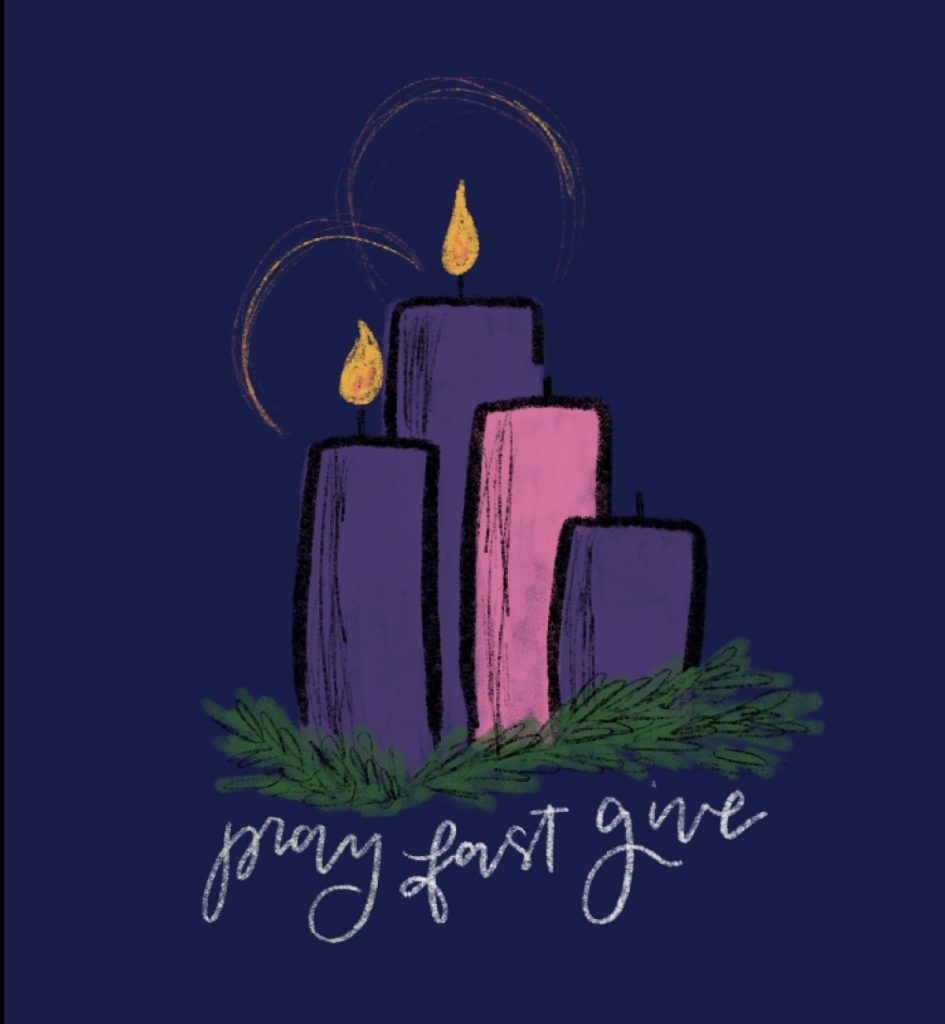December 11, 2023 // Diocese
The Benefits of Fasting During a Season of Feasting
How Personal Sacrifice in Advent Can Help Us Prepare for the Coming of Christ
Shopping, baking, wrapping, and decorating can seem to eat away at our time as we prepare for the Christmas holiday. Efforts to spread cheer, no matter how well-intentioned, can distract us from the spiritual significance of the Advent and Christmas seasons. All this distraction, however, can lead us to seek means to how we can grow closer to the Christ Child as we prepare for – and then celebrate – His birth. Fasting is one such option.
The word “Advent” comes from the Latin ad-venire, meaning “to come to.” This liturgical season encompasses the four weeks leading to Christmas. During this time, we are invited to prepare our minds and hearts for the coming of Jesus at the end of time and recall His birth.
The Church recognizes the preparatory aspect of Advent in its practice. The General Instruction of the Roman Missal calls for a simpler altar decoration and the wearing of purple vestments on the First, Second, and Fourth Sundays of Advent (and rose on the Third Sunday) by the priest. “Like Lent,” the U.S. Conference of Catholic Bishops notes, “the liturgical color for Advent is purple since both [Advent and Lent] are seasons that prepare us for great feast days. Advent also includes an element of penance in the sense of preparing, quieting, and disciplining our hearts for the full joy of Christmas.”
Historically, Advent has been celebrated with some form of fasting since the fourth century. In Latin, “December” means “10th month,” and the earliest Christians would have connected it to the prescribed fast of Jewish tradition in Zechariah 8:19.
Beyond tradition, though, modern thinkers point to benefits of fasting during this season of preparation. In an article entitled “The Advent Fast” for the Center for Christian Ethics at Baylor University, Professor Thomas Turner wrote: “Fasting helps us proclaim God’s story – a narrative of love that requires watchful preparation of our hearts and minds, and patient waiting for God’s faithful completion of divine promises – in a countercultural way. While the surrounding culture is being consumed by a perpetual feast beginning at Thanksgiving, we can present the Gospel by returning to the Advent fast. … This can be a prophetic, redemptive rejection of the personal instant gratification, materialism, and gluttony exhibited in cultural holiday celebrations.”
Like Lent, some modern Catholics may add elements of fasting to their recognition of the time before Christmas. Modern Catholic practices have placed greater emphasis on the personal meaning of liturgical observance, the time of Advent being no exception. For example, in their November 1966 writings, the National Council of Catholic Bishops articulated its hopes for genuine connection to God through penance during Advent, writing: “Forms and seasons of penance vary from time to time and from people to people. But the need for conversion and salvation is unchanging, as is the necessity that, confessing our sinfulness, we perform, personally and in community, acts of penance in pledge of our inward penitence and conversion. … Christian peoples, members of a Church that is at once holy, penitent, and always in process of renewal, have from the beginning observed seasons and days of penance. They have done so by community penitential observances as well as by personal acts of self-denial; they have imitated the example of the spotless Son of God Himself, concerning Whom the Sacred Scriptures tell us that He went into the desert to fast and to pray for 40 days (Mk 1:13). Thus, Christ gave the example to which Paul appealed in teaching us how we, too, must come to the mature measures of the fullness of Christ (Eph 4:13)”.
With a good plan, a meaningful Advent fast is possible for the modern Catholic and a variety of ways in which we can participate.
In an article for Radiant magazine – an online publication for young Catholic women – writer Laura O’Callaghan reminds readers that the Church does not require fasting during the Advent season. Rather, she offers that one might look to activities such as volunteering in one’s parish or larger community. “While fasting during Advent isn’t required of us Catholics, one thing is required of us: seeking holiness. Whatever the season, our number one job as followers of Christ is to follow Him more closely every day.”
Another version of fasting is embodied in the giving up of something other than food. Social media or Netflix could go, O’Callaghan suggests, to create a climate to focus on silence and turn our attention to the coming of Christ. “Honestly,” she writes, “deliberately cultivating silence in the leadup to Christmas can be as difficult as giving up chocolate for Lent.”
Fasting from food, of course, is still very much an option for Catholics seeking to sacrifice for the purpose of growing closer to Christ this Advent. While the liturgical calendar need not dictate our fasting, the Advent season can offer an ideal time parameter. O’Callaghan writes: “Fasting detaches our spirit from this world, teaches us self-control, and helps us to long for God as the fulfillment of all our desires. That is perfect for Advent.”
So, while it may not be a Church requirement, fasting during Advent can reap benefits to help us grow closer in our most important relationship – that with God – that can last the whole year.
The best news. Delivered to your inbox.
Subscribe to our mailing list today.







